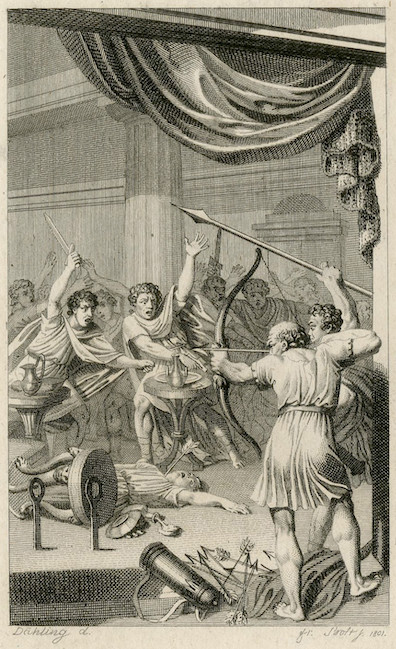After Bloom's "stratagem" of entering his
house via the downstairs kitchen, which recalls Homer's story
of the hero entering his palace disguised as an old beggar, he
goes upstairs and lets Stephen in by the street door. The
narrative asks, "Did Stephen obey his sign?" Answer: "Yes,
entering softly, he helped to close and chain the door and
followed softly along the hallway." These details recall
related events of the Odyssey—specifically, the
preparations leading up to the confrontation with the suitors.
In advance of the bow-stringing contest and the mass
slaughter in book 22, Odysseus makes his identity known to
three slaves who have remained faithful to him: his swineherd
Eumaeus,
a cowherd named Philoetius, and his old wet nurse Eurycleia.
Standing outside the palace, he tells the two men who he is
and they tearfully embrace, but he warns them not to let
displays of emotion alert the suitors, and he instructs them
in how to enter the house:
"Stop now; if someone steps outside
and sees you crying, they may tell the men.
Go in, not both at once but taking turns,
first me, then you, then you. And this will be
our sign: when all the noblemen refuse
to let me have the bow and set of arrows,
then you must bring them through the hall, Eumaeus,
and put them in my hands. Command the women
to shut up tight the entrance to the hall,
and go to their own quarters; if they hear
men screaming or loud noises, they must not
come out, but stay there quietly, and work.
And you, Philoetius, lock up the gates
leading out from the courtyard with the bolt
and put the rope on too. We must move fast."
(21.228-42, trans. Wilson)
Eumaeus went across the hall and gave
the bow to competent Odysseus.
And then he summoned Eurycleia, saying,
"Telemachus gave orders you must lock
the doors into the hall and tie them fast.
If any of you women hear a noise
of screaming men, stay up there in your quarters;
do not come out; keep quiet and keep working."
At that, she held her tongue and locked the doors
that led into the feast-hall. Philoetius
scurried outside to bolt the outer gates
that led into the courtyard. On the porch
lay a fresh-knotted cable made of byblos;
with that, he tied the gates, rushed in and sat
back down, and looked towards Odysseus.
(21.383-91)
Telemachus's job, assigned by his father in book 19, is to hide
all the palace's weapons in a storage room so that the suitors
cannot arm themselves. He apparently does not lock any doors
himself, and indeed he nearly causes disaster by neglecting to
secure the door of the storage room. These facts weaken
Gifford's claim that helping Bloom "
close and chain the door"
is an allusion to Telemachus helping his father "pen the suitors
in the house when the killing begins in Book 22." Perhaps in
recognition of this discrepancy, other annotators have declined
to second Gifford's observation, but his claim is fundamentally
sound. Even though Telemachus does not himself lock any doors,
Joyce associates the entry into Bloom's house with several
details that are highly suggestive of the events in the
Odyssey.
First, he characterizes Bloom as a master demanding
obedience and communicating through signs: "
Did Stephen obey
his sign?" Unlike the "sign" for deadly confrontation
shared between Odysseus and Eumaeus, Bloom's is probably
something like a finger to the lips signaling, "Please be quiet
because my wife is sleeping upstairs." There is nothing very
imperious about such a request, and by complying ("
entering
softly") Stephen displays only civility, not servitude.
But given Bloom's consistently deferential relationship to
Stephen, the word "obey" is striking. It invites mock-heroic
thoughts of Odysseus commanding his swineherd and cowherd to
mute their emotion before entering the palace.
Bloom also apparently asks Stephen to lock the door, and this
too is striking—what host would ask that of a guest he met only
a few hours previously? As with the word "obey," the effect is
to invite consideration of a symbolic analogue: Odysseus telling
his slaves to lock the palace doors. The request may make some
realistic sense, since Bloom has entered the house before
Stephen and now is turning to lead him down the stairs to the
kitchen, but if so there is a symbolic echo of Odysseus here
too—"first me, then you." Perhaps the most telling detail of all
is the mention of Stephen chaining Bloom's door. Odysseus
commands Philoetius to lock the gates "
and put the rope on
too," and Philoetius does so with "
a fresh-knotted
cable." Eumaeus similarly gives orders for Eurycleia to
lock the doors "
and tie them fast." Surely Bloom's
request to "close and chain the door" invites comparisons with
the
Odyssey.
These resemblances do not mean that anything like mass
murder will take place in Ithaca. But they do suggest
that Joyce wants readers to be looking for Homeric
correspondences and inquiring into their symbolic resonances.
